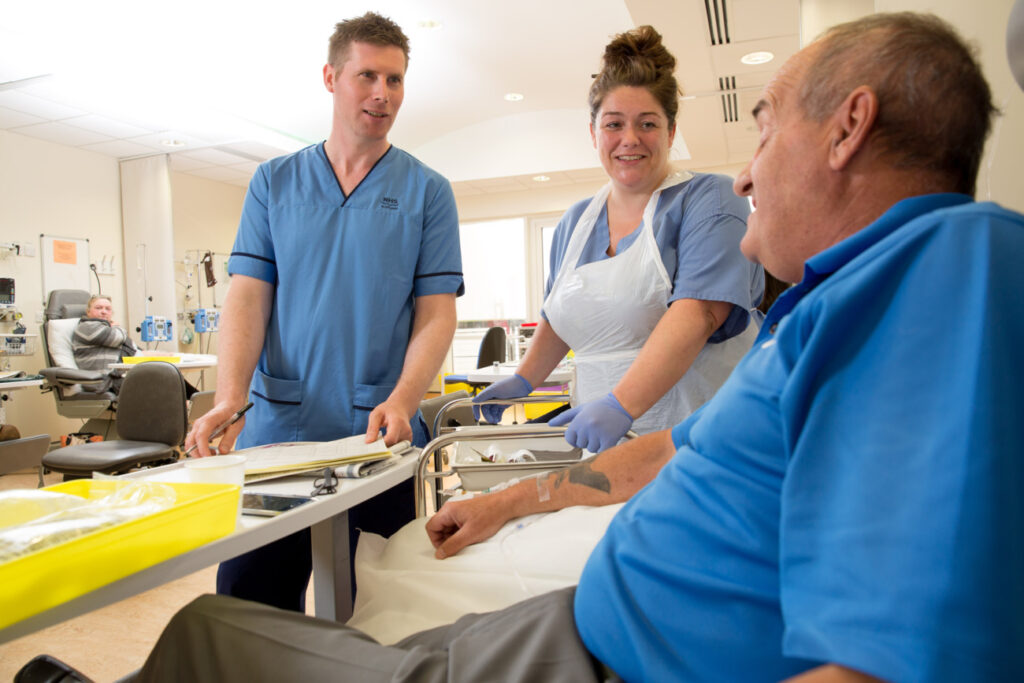Medicine Treatment for your Breast Cancer – Terminology
It is helpful to understand some of the labels used to describe the different types of medicines used to treat cancer. As medicines go into the systems in your body they are called Systemic Anti-Cancer Therapy (SACT).
There are three main categories of anti-cancer medicines used for breast cancer:
- Chemotherapy
- Immunotherapy
- Hormone Therapy
You can access helpful resources around these medicines here:
The timing of your medicine treatment may be:
- Before you have your surgery, which is called neo-adjuvant therapy, or
- After you have your surgery, which is called adjuvant therapy.
The timing of chemotherapy is usually once every 2-3 weeks and the combination of medicines used for you is called your regimen.
Medicines may be given by injection into the veins (intravenous), by injection under the surface of the skin (subcutaneous) or in tablet/capsule form (oral).
Do I need to have chemotherapy?
Not everyone with breast cancer needs to have chemotherapy. If there is a very low risk that your cancer will come back, having chemotherapy may do more harm than good. Your team will discuss the risks and benefits of treatment and help you decide what is best for you.
The factors which help to guide whether chemotherapy would be helpful for you include:
- The ‘stage’ of your cancer
- This is about the size of your tumour and whether it has spread
- The ‘grade’ of your cancer
- This describes the pace of growth of your cancer cells
- Whether your cancer cells have proteins (receptors) on their surface which can be used as treatment targets: including:
– Hormone receptors
– HER2 receptors - How many lymph nodes (glands) contain cancer cells
- Whether you have reached the menopause
- If you are a man who has breast cancer
There are calculations your team can do depending on these factors to predict the risk of your cancer coming back, this will help guide the decision on whether chemotherapy would be helpful to you. For ‘high risk’ patients chemotherapy will usually be recommended whereas for ‘low risk’ patients chemotherapy does not offer benefit. For the ‘intermediate risk’ patients there may be additional tests that can be done on your own genetics profile to help you decide.

Why are there different chemotherapy options and which medicines should I get?
If you have early-stage breast cancer which is just within your breast and your lymph nodes (glands) then the options for chemotherapy fall into 3 separate categories, depending on the proteins or receptors on the surface of your cancer cells:
- Hormone receptor positive (oestrogen and progesterone) and HER2 negative
- HER2 positive which is a protein called human epidermal growth factor receptor 2. This protein encourages growth of cancer cells so whether or not positive for hormone receptors, extra treatment is needed to target this.
- ‘Triple negative’ which is no receptors for hormones or HER2
What medicine treatment is recommended after surgery?
Why is my treatment different from the standard options?
If you have a heart condition or tests done during treatment suggest you may be getting side effects affecting how well your heart is working, then adjustments in dose or choice of medicine may be required. The medicines which can potentially work against the heart are epirubicin and medicine for HER2 (trastuzumab and pertuzumab).
The taxane medicines can cause damage to nerve endings, this can cause pins and needles or numbness. If you have a condition which has already affected your nerve endings (like diabetes) this too may be a factor in deciding which medicines are best for you.
If you experience side effects from your treatment that mean your next dose is delayed or that cause you to be admitted to hospital, then your team may discuss adjustments to your medicines or doses based on any risks.
There is variation in how often some medicines may be given, for example chemotherapy may be given 2-weekly or 3-weekly. Similarly with immunotherapy there is flexibility in the scheduling of treatment. This may vary according to which hospital you are receiving treatment at, discuss any uncertainty with your team.
Will I be offered hormone therapy?
If your cancer cells test positive for hormone receptors (oestrogen and progesterone) this usually means that lowering your level of hormones can be effective treatment against your cancer.
The type of hormonal therapy you have depends on:
- whether you have been through the menopause or not
- the risk of the cancer coming back
- how the side effects are likely to affect you
If you are due to have chemotherapy then the hormone treatment will usually start after you have completed your course of chemotherapy. If you are not having chemotherapy then hormone treatment will start after your surgery.
Hormone therapy is recommended for a minimum of 5 years to help prevent the cancer coming back. You will have a review appointment after 5 years to decide if you should stop, change or continue with your therapy.
There is a variety of different hormone medicines available and your team will discuss the options and suggest which is most appropriate for you.
Will I be offered bone therapy?
You may be offered bone therapy (adjuvant bisphosphonates) to lower the risk of cancer returning and spreading to the bone. The bisphosphonate medicines most commonly used are:
- zoledronic acid, which is given by a drip (infusion) into a vein every 6 months
- clodronate, which is taken as a tablet
- ibandronate, which is taken as a tablet
Treatment is usually given for 3 years. Your healthcare team can tell you if bisphosphonates are likely to be helpful for you. It is important to weigh up the possible benefits against the side effects of the medicines.